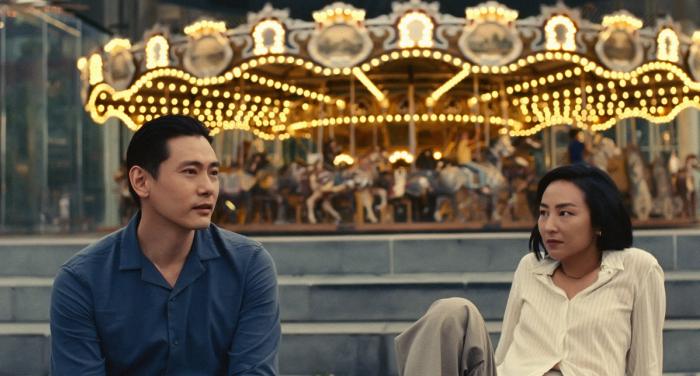
It’s a game we’ve all played before. The night’s winding down, and you’re sitting with some friends at a bar. You notice a group of three people, and the energy radiating between them is palpable. You nudge your friend covertly on the shoulder and ask, what do you think their deal is? Who are they to each other?
“Past Lives,” a new film from writer/director Celine Song, invites us to play this beloved barstool pastime on a cinematic scale. Song asks us to contemplate the connection between two childhood friends – Nora (Greta Lee) and Hae Sung (Teo Yoo) – who have reunited in New York City decades after Nora’s family emigrated from South Korea to Canada.
The two were almost, not-quite sweethearts – a little too young to understand or act on those burgeoning feelings at the time of Nora’s departure, and a reconnection via video chat years later was short-lived. But now, Hae Sung’s trip to New York raises questions about missed opportunities, and throws his and Nora’s – and Nora’s husband Arthur’s (John Magaro) – worlds off their axes.
“Past Lives,” an intensely personal look at both the paths we take and the ones we don’t, seeps through the cracks in your armor so subtly, you don’t realize you’re coming apart at the seams until it’s too late. Equal parts heart-wrenching and thrillingly romantic, the film overflows with feeling without being overwrought, its expressive camerawork and contemplative script working in tandem with actors who are wholly in tune with each other physically and emotionally. “Past Lives” is an exceptional debut from Song and already shaping up to be one of the best films of the year, quietly rising to a crescendo that stops your heart in its tracks.
There’s this thing in Korea called In-Yun, Nora tells Arthur on one of their first nights together. It has to do with fate and predetermination – this idea that the smallest connection between two human beings in this life reverberates through all their future lives until they finally find each other somewhere down the cosmic road. The concept is the core of the film, not just through its numerous mentions, but in the way Song paints us a picture of longing With the help of cinematographer Shabier Kirchner, Song creates a visual language for In-Yun. The middle section of the film finds Nora in New York and Hae Sung in Seoul, their only connection to one another a grainy, usually lagging video chat. Throughout this section, there are sweeping, panning shots across the couple’s respective cities. These shots often move across the screen in opposite directions, quite like two people passing each other as they walk down the street, their sleeves barely brushing as they just miss each other.
This subtle visual language tells us everything. Nora and Hae Sung are framed in opposition to each other as often as they are in harmony. The first time Arthur meets Hae Sung, he stands between them, not so much an obstacle as he is a reminder of the life Nora has standing in contrast to the one she doesn’t. In other moments, the connection between Hae Sung and Nora is so intimately performed and shot that even when Arthur is present, he’s cut out of the frame entirely. We never forget he’s there, the tension between his presence and Nora and Hae Sung’s closeness drawn taut as a drum. But for as much as he ostensibly knows Nora better, there is something here that he stands on the outside of.
But in a sense, everyone stands as an outsider to the path they didn’t take. Arthur is the obvious odd man out, laden with insecurity, but almost resigned to the connection he sees before him. When he first sees Nora and Hae Sung together – in a moment beautifully acted by Magaro – there’s almost a sweetness to Arthur’s sorrow at seeing the two of them, tension evaporating from his shoulders as he takes in the sight. Hae Sung is less insecure but equally unmoored, watching the girl he might have once maybe loved in her new life in a city where he barely speaks the language. Nora is the most solid of the three, steadfast in the life she’s made for herself, but still with lingering questions about her own identity and fate and freewill – all of which Hae Sung complicates. None of this is really extraordinary. And yet, the emotional stakes are delivered with such precision and specificity that each individual moment feels monumental.
As “Past Lives” builds to its ending, so does a sense of inevitability that stands on a precipice for much longer than feels safe. The film’s stillness, particularly in its last act, vibrates with a question that’s intensity will have you white-knuckling as hard as any thriller. That tension culminates with a scene where the direction and the performances – particularly Lee’s uncanny ability to communicate so much yearning and uncertainty with just her physicality – hurdle you toward a conclusion that’s tailor-made to break your heart.
